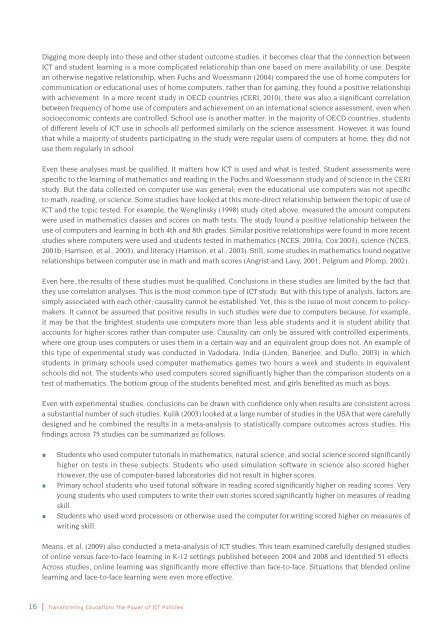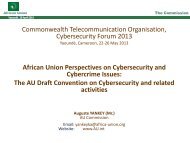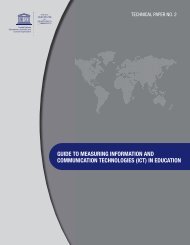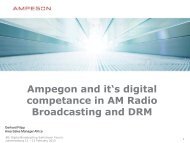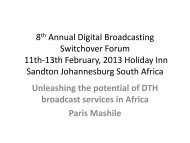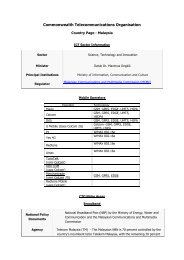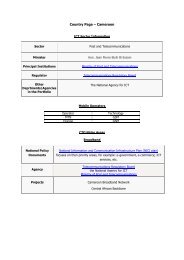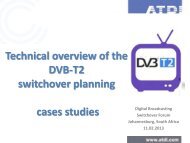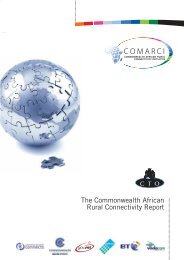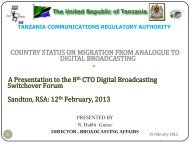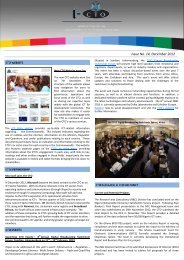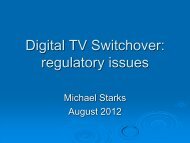Transforming education: the power of ICT policies - Commonwealth ...
Transforming education: the power of ICT policies - Commonwealth ...
Transforming education: the power of ICT policies - Commonwealth ...
You also want an ePaper? Increase the reach of your titles
YUMPU automatically turns print PDFs into web optimized ePapers that Google loves.
Digging more deeply into <strong>the</strong>se and o<strong>the</strong>r student outcome studies, it becomes clear that <strong>the</strong> connection between<br />
<strong>ICT</strong> and student learning is a more complicated relationship than one based on mere availability or use. Despite<br />
an o<strong>the</strong>rwise negative relationship, when Fuchs and Woessmann (2004) compared <strong>the</strong> use <strong>of</strong> home computers for<br />
communication or <strong>education</strong>al uses <strong>of</strong> home computers, ra<strong>the</strong>r than for gaming, <strong>the</strong>y found a positive relationship<br />
with achievement. In a more recent study in OECD countries (CERI, 2010), <strong>the</strong>re was also a signifi cant correlation<br />
between frequency <strong>of</strong> home use <strong>of</strong> computers and achievement on an international science assessment, even when<br />
socioeconomic contexts are controlled. School use is ano<strong>the</strong>r matter: in <strong>the</strong> majority <strong>of</strong> OECD countries, students<br />
<strong>of</strong> different levels <strong>of</strong> <strong>ICT</strong> use in schools all performed similarly on <strong>the</strong> science assessment. However, it was found<br />
that while a majority <strong>of</strong> students participating in <strong>the</strong> study were regular users <strong>of</strong> computers at home, <strong>the</strong>y did not<br />
use <strong>the</strong>m regularly in school.<br />
Even <strong>the</strong>se analyses must be qualifi ed. It matters how <strong>ICT</strong> is used and what is tested. Student assessments were<br />
specifi c to <strong>the</strong> learning <strong>of</strong> ma<strong>the</strong>matics and reading in <strong>the</strong> Fuchs and Woessmann study and <strong>of</strong> science in <strong>the</strong> CERI<br />
study. But <strong>the</strong> data collected on computer use was general; even <strong>the</strong> <strong>education</strong>al use computers was not specifi c<br />
to math, reading, or science. Some studies have looked at this more-direct relationship between <strong>the</strong> topic <strong>of</strong> use <strong>of</strong><br />
<strong>ICT</strong> and <strong>the</strong> topic tested. For example, <strong>the</strong> Wenglinsky (1998) study cited above, measured <strong>the</strong> amount computers<br />
were used in ma<strong>the</strong>matics classes and scores on math tests. The study found a positive relationship between <strong>the</strong><br />
use <strong>of</strong> computers and learning in both 4th and 8th grades. Similar positive relationships were found in more recent<br />
studies where computers were used and students tested in ma<strong>the</strong>matics (NCES, 2001a; Cox 2003), science (NCES,<br />
2001b; Harrison, et al., 2003), and literacy (Harrison, et al., 2003). Still, some studies in ma<strong>the</strong>matics found negative<br />
relationships between computer use in math and math scores (Angrist and Lavy, 2001; Pelgrum and Plomp, 2002).<br />
Even here, <strong>the</strong> results <strong>of</strong> <strong>the</strong>se studies must be qualifi ed. Conclusions in <strong>the</strong>se studies are limited by <strong>the</strong> fact that<br />
<strong>the</strong>y use correlation analyses. This is <strong>the</strong> most common type <strong>of</strong> <strong>ICT</strong> study. But with this type <strong>of</strong> analysis, factors are<br />
simply associated with each o<strong>the</strong>r; causality cannot be established. Yet, this is <strong>the</strong> issue <strong>of</strong> most concern to policymakers.<br />
It cannot be assumed that positive results in such studies were due to computers because, for example,<br />
it may be that <strong>the</strong> brightest students use computers more than less able students and it is student ability that<br />
accounts for higher scores ra<strong>the</strong>r than computer use. Causality can only be assured with controlled experiments,<br />
where one group uses computers or uses <strong>the</strong>m in a certain way and an equivalent group does not. An example <strong>of</strong><br />
this type <strong>of</strong> experimental study was conducted in Vadodara, India (Linden, Banerjee, and Dufl o, 2003) in which<br />
students in primary schools used computer ma<strong>the</strong>matics games two hours a week and students in equivalent<br />
schools did not. The students who used computers scored signifi cantly higher than <strong>the</strong> comparison students on a<br />
test <strong>of</strong> ma<strong>the</strong>matics. The bottom group <strong>of</strong> <strong>the</strong> students benefi ted most, and girls benefi ted as much as boys.<br />
Even with experimental studies, conclusions can be drawn with confi dence only when results are consistent across<br />
a substantial number <strong>of</strong> such studies. Kulik (2003) looked at a large number <strong>of</strong> studies in <strong>the</strong> USA that were carefully<br />
designed and he combined <strong>the</strong> results in a meta-analysis to statistically compare outcomes across studies. His<br />
fi ndings across 75 studies can be summarized as follows:<br />
apple Students who used computer tutorials in ma<strong>the</strong>matics, natural science, and social science scored signifi cantly<br />
higher on tests in <strong>the</strong>se subjects. Students who used simulation s<strong>of</strong>tware in science also scored higher.<br />
However, <strong>the</strong> use <strong>of</strong> computer-based laboratories did not result in higher scores.<br />
apple Primary school students who used tutorial s<strong>of</strong>tware in reading scored signifi cantly higher on reading scores. Very<br />
young students who used computers to write <strong>the</strong>ir own stories scored signifi cantly higher on measures <strong>of</strong> reading<br />
skill.<br />
apple Students who used word processors or o<strong>the</strong>rwise used <strong>the</strong> computer for writing scored higher on measures <strong>of</strong><br />
writing skill.<br />
Means, et al. (2009) also conducted a meta-analysis <strong>of</strong> <strong>ICT</strong> studies. This team examined carefully designed studies<br />
<strong>of</strong> online versus face-to-face learning in K-12 settings published between 2004 and 2008 and identifi ed 51 effects.<br />
Across studies, online learning was signifi cantly more effective than face-to-face. Situations that blended online<br />
learning and face-to-face learning were even more effective.<br />
16 | <strong>Transforming</strong> Education: The Power <strong>of</strong> <strong>ICT</strong> Policies


